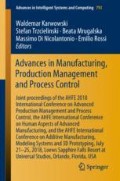Abstract
The multi-scale analysis of energy loss in supply chains allows a causal link to be identified identifying the micro-processes and priority behaviors that cause the greatest socio-environmental impact on the macro-processes inside the global chains of product circulation. In this way, global programs and goals can be achieved in a proper way. This article intends to discuss concepts, goals and techniques applied to the work environment and the environment of the cities in their operational routine. These routines cause high frequency energy losses, low individual impact and high impact on event integration. This routine influences industrial activity, the local and global supply chain. The overall indicator to be monitored is the emission of greenhouse gases and the reduction in non-renewable fuel consumption. The local indicator to be measured is loss of energy in activities and operations, frequency and intensity based on the number of actors that act by losing energy.
Access this chapter
Tax calculation will be finalised at checkout
Purchases are for personal use only
References
Phylipsen, G.J.M.: Energy Efficiency Indicators: Best practice and potential use in developing country policy making. Phylipsen Climate Change Consulting (2010)
Abubakar, T.: A Study of Sustainability in the Oil and Gas Supply Chain. Doctoral thesis at University of Central Lancashire in Philosophy (2014)
Energy Efficiency 2017: Market Report Series. International Energy Agency (IEA) (2017)
Marchi, B., Zanoni, S.: Supply chain management for improved energy efficiency: review and opportunities. Energies 10, 1618 (2017)
Saving energy in the oil and gas industry: The global oil and gas industry association for environmental and social issues. IPIECA, London (2013)
Letwin, O., Barker, G., Stunell, A.: Behaviour Change and Energy Use. Department of Energy & Climate Change (2015)
Farley, K., Mazur-Stommen, S.: Saving Energy with Neighborly Behavior: Energy Efficiency for Multifamily Renters and Homebuyers. American Council for an Energy-Efficient Economy, Washington (2014)
Avila, S: Methodology to minimize effluent at the source from the investigation of operational abnormalities: Cases of the chemical industry. 229f. Thesis, Master degree in master’s degree in environmental technologies in the production process - Environmental Engineering Department of UFBA, Federal University of Bahia, Salvador (2004)
Avila, S.: Etiology of Operational Abnormalities in Industry: A Model for Learning. 296f. Thesis, Doctorate degree in Technology of Chemical and Biochemical Processes - School Of Chemistry of UFRJ. Federal University of Rio de Janeiro, Rio de Janeiro (2010)
Robertson, A.: Energy Efficiency Commitment. In: Aberdeenshire’s Council Housing Stock – Aberdeenshire Council (2006)
Ávila, S.F., Costa, C.: Analysis of cognitive deficit in routine task, as a strategy to reduce accidents and industrial increase production. In: Safety and Reliability of Complex Engineered Systems, London, pp. 2837–2844
Avila, S.F., Drigo, E.S.: Evaluation of human factors through behavior, C4t. In: III Congress Brazilian Association for Risk Analysis, Process Safety and Reliability – ABRISCO, Rio de Janeiro (2017)
Avila, S.F.: Improving the task and communication for a fair culture in energy and safety, exercise of intervention in the metallurgical industry and offshore oil production. In: III Congress Brazilian Association for Risk Analysis, Process Safety and Reliability – ABRISCO, Rio de Janeiro (2017)
Drigo, E., Ávila, F.S.: Organizational communication: discussion of pyramid model application in shift records. In: Kantola, J.I., et al. (eds.) Advances in Human Factors, Business Management, Training and Education. Advances in Intelligent Systems and Computing, vol. 498. Springer International Publishing, Switzerland (2017b)
Avila, S.F., Sousa, C.R., Carvalho, A.C.: Assessment of complexity in the task to define safeguards against dynamic risks. Procedia Manuf. 3, 1772–1779 (2015). 6th International Conference on Applied Human Factors and Ergonomics (AHFE 2015)
Galvão, C.: Operational practices for reducing energy consumption in production procedures. In: III Congress Brazilian Association for Risk Analysis, Process Safety and Reliability – ABRISCO, Rio de Janeiro (2017)
Ferreira, J.: Analysis of the impact of low operational reliability on the energy indicators of an oil refinery. In: III Congress Brazilian Association for Risk Analysis, Process Safety and Reliability – ABRISCO, Rio de Janeiro (2017)
Avila, S.F.: Thermal performance assessment through cooling tower modeling: refinery case. In: Cooling Technology Institute Annual Conference, Houston, Texas (2018)
Author information
Authors and Affiliations
Corresponding author
Editor information
Editors and Affiliations
Rights and permissions
Copyright information
© 2019 Springer International Publishing AG, part of Springer Nature
About this paper
Cite this paper
Ávila Filho, S., Cerqueira, I., Ávila, J.S. (2019). Energy Loss Risk (ELOS R) in Supply Chain, Micro-processes to Decrease Greenhouse Gas Emissions. In: Karwowski, W., Trzcielinski, S., Mrugalska, B., Di Nicolantonio, M., Rossi, E. (eds) Advances in Manufacturing, Production Management and Process Control. AHFE 2018. Advances in Intelligent Systems and Computing, vol 793. Springer, Cham. https://doi.org/10.1007/978-3-319-94196-7_33
Download citation
DOI: https://doi.org/10.1007/978-3-319-94196-7_33
Published:
Publisher Name: Springer, Cham
Print ISBN: 978-3-319-94195-0
Online ISBN: 978-3-319-94196-7
eBook Packages: EngineeringEngineering (R0)

